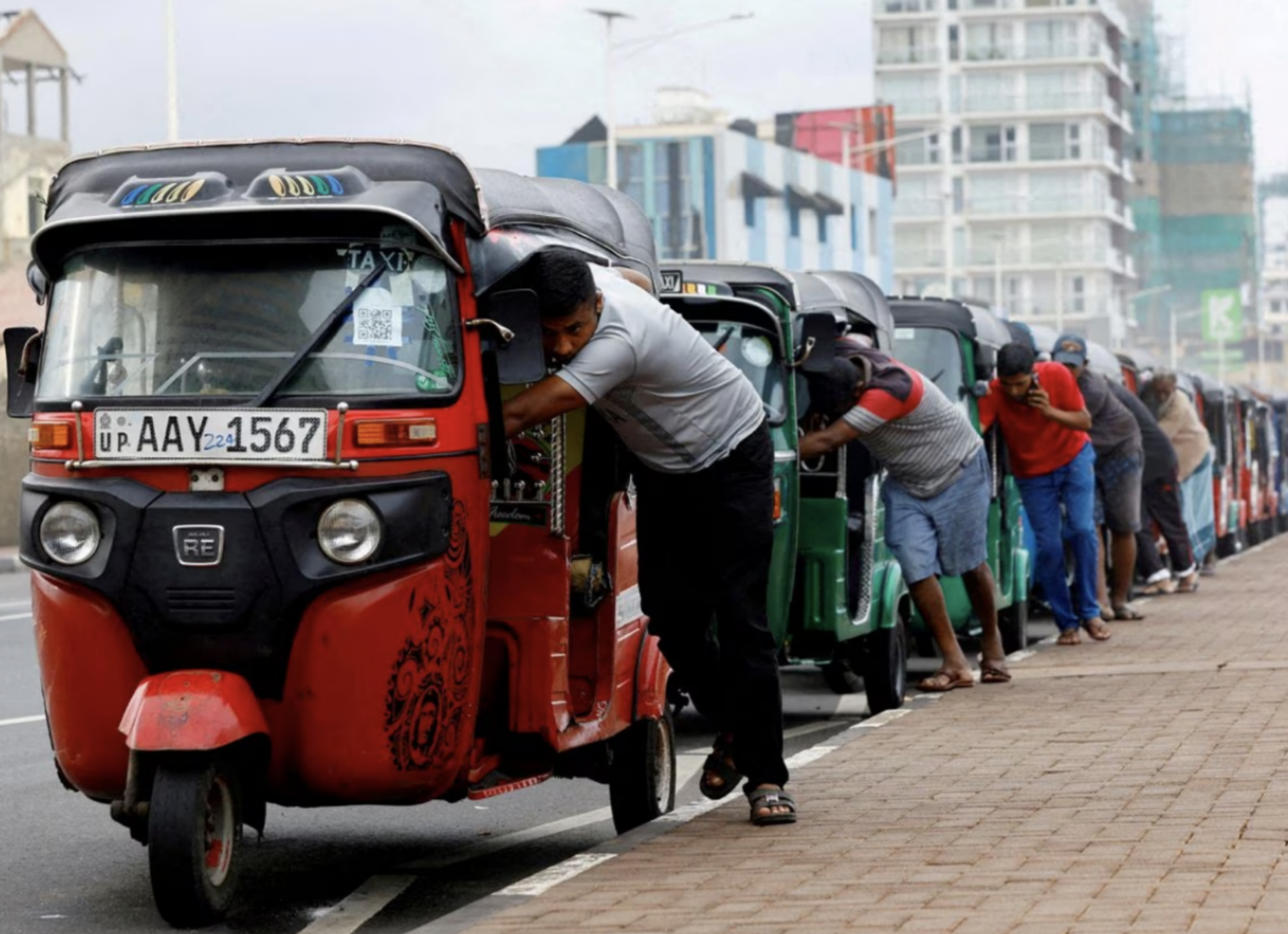Sri Lanka Approves Liberalization of Fuel Market
Drivers push auto rickshaws in a line to buy petrol from a fuel station amid Sri Lanka's economic crisis, in Colombo, Sri Lanka, July 29, 2022. Source: REUTERS/Kim Kyung-Hoon/File Photo
Sri Lanka’s fuel market was a state monopoly under Ceylon Petroleum Corporation (CPC) until 2003, when the Indian Oil Corporation became the only other company allowed to operate. However, as Sri Lanka’s economy is continually struggling to stay afloat, the Cabinet has approved a proposal to liberalize the fuel retail market. The island nation is now allowing companies from China, Australia, and the US to enter the market, in the hopes that fuel prices may decrease and provide additional economic benefits to the government and local communities.
The Energy Minister, Kanchana Wijesekara, recently tweeted that the Cabinet’s approval of this policy will entail granting award licenses to Sinopec, United Petroleum Australia, and RM Parks from the United States. The minister also mentioned that these companies will be given a 20 year license to import, store, distribute, and sell petroleum products to Sri Lanka. Although there has been some resistance from local fuel sector trade unions, Sri Lanka’s Ceylon Chambers of Commerce (CCC) believe that the decision to restructure the state-run power sector of the country will ensure the country’s sustainable revival.
The chamber recognizes that by introducing this structural reform, policymakers in the Power and Energy sector have ensured that greater competition is being introduced to the petroleum industry, which was previously dominated by the state. By increasing competition in this sector, individuals can also benefit from improved quality of service and connectivity within Sri Lanka’s urban, cities and rural areas will also greatly improve as more petroleum pumps can be set up in remote areas of the country. Such strides are being taken after the vulnerabilities that Sri Lanka faced in 2022 due to a shortage of dollars in the banking system due to the nation’s over-reliance on the CPC to produce dollars and distribute fuel. The Cabinet came to the conclusion that reducing over-reliance on the CPC is an integral component to ensure that such obstacles are not encountered in the future.
On March 20, the International Monetary Fund’s (IMF) Executive Board also approved a $3 billion (USD) loan under the New Extended Fund Facility (EFF) Arrangement for Sri Lanka. Policy makers believed that through such economic assistance and improved market reforms, the nation is on track to improve their economic prosperity in the upcoming decade.
Protesters carrying the Sri Lanka flag march in the Galle Face Green area of Colombo, Sri Lanka, May 17, 2022. Source: Atul Loke/The New York Times.
As reported by the Federal Reserve Bank of San Francisco, economic growth is generally reduced once oil prices rise due to increased inflation. In terms of inflation, the prices of goods made with petroleum products are directly affected by oil prices. Oil prices can be seen as the backbone of many economies because they affect costs such as heating, transportation, and manufacturing. During the recent “Economic Dialogue - IMF and Beyond Forum”, the President referred to Sri Lanka’s two main challenges, which boil down to economic and ethnic issues. The President believed that in order to achieve real progress, policies must be focused on improving these aspects of the nation since these are fundamental anchors that will dictate the future of the country.
By recognizing the nexus between reconciliation, ethnic harmony, and economic reform, tangible actions can be taken to bolster the nation’s success. Through this petroleum reform, it has become increasingly evident that the Chamber is beginning to support initiatives that strive to create programs at a business level in order to achieve the agendas that they have set for themselves.
In the past, the lack of government transparency has led to corruption with previous reform schemes, hindering the progress of economic development and led to scarce levels of foreign direct investments. In order to tangibly implement this petroleum reform, the government must be cognizant of the inherent complexities and set governance structures which will facilitate the divestiture of non-strategic commercial assets and stakes. This would not only be beneficial with this petroleum scheme, but also with the IMF’s engagement with the government. The IMF is focused on improving Sri Lanka’s governance framework through a diagnostic analysis, which serves as a structural benchmark under the Extended Fund Facility. By driving a progressive reform agenda, the government is acknowledging that the Private Sector is an equal partner in ensuring an accelerated economic recovery.


